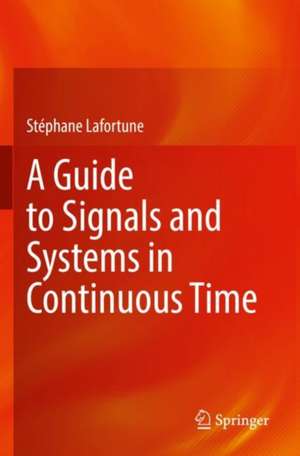A Guide to Signals and Systems in Continuous Time
Autor Stéphane Lafortuneen Limba Engleză Paperback – 12 mar 2023
| Toate formatele și edițiile | Preț | Express |
|---|---|---|
| Paperback (1) | 278.80 lei 3-5 săpt. | +13.62 lei 4-10 zile |
| Springer International Publishing – 12 mar 2023 | 278.80 lei 3-5 săpt. | +13.62 lei 4-10 zile |
| Hardback (1) | 319.43 lei 6-8 săpt. | |
| Springer International Publishing – 12 mar 2022 | 319.43 lei 6-8 săpt. |
Preț: 278.80 lei
Nou
Puncte Express: 418
Preț estimativ în valută:
53.36€ • 55.50$ • 44.05£
53.36€ • 55.50$ • 44.05£
Carte disponibilă
Livrare economică 24 martie-07 aprilie
Livrare express 07-13 martie pentru 23.61 lei
Preluare comenzi: 021 569.72.76
Specificații
ISBN-13: 9783030930295
ISBN-10: 3030930297
Pagini: 114
Ilustrații: XIV, 114 p. 5 illus.
Dimensiuni: 155 x 235 x 12 mm
Greutate: 0.19 kg
Ediția:1st ed. 2022
Editura: Springer International Publishing
Colecția Springer
Locul publicării:Cham, Switzerland
ISBN-10: 3030930297
Pagini: 114
Ilustrații: XIV, 114 p. 5 illus.
Dimensiuni: 155 x 235 x 12 mm
Greutate: 0.19 kg
Ediția:1st ed. 2022
Editura: Springer International Publishing
Colecția Springer
Locul publicării:Cham, Switzerland
Cuprins
1. Introduction.- 2. Systems.- 3. Periodic Signals and Fourier Series.- 4. Analysis of Stable Systems using the Fourier Transform.- 5. Sampling and Reconstruction.- 6. Analysis and Control of Systems using the Laplace Transform.
Notă biografică
Stéphane Lafortune was born in Montréal, Québec, Canada. He received the B.Eng degree from École Polytechnique de Montréal in 1980, the M.Eng degree from McGill University in 1982, and the Ph.D degree from the University of California at Berkeley in 1986, all in electrical engineering. Since September 1986, he has been with the University of Michigan, Ann Arbor, where he is a Professor of Electrical Engineering and Computer Science. In March 2018, he was appointed as the N. Harris McClamroch Collegiate Professor of Electrical Engineering and Computer Science. Lafortune is a Fellow of the IEEE (1999) and of the IFAC (2017). He received the Presidential Young Investigator Award from the U.S. National Science Foundation in 1990 and the Axelby Outstanding Paper Award from the Control Systems Society of the IEEE in 1994 (for a paper co-authored with S.-L. Chung and F. Lin) and in 2001 (for a paper co-authored with G. Barrett). Lafortune's research interests are in discrete event systems andinclude multiple problem domains: modeling, diagnosis, control, optimization, and applications to computer and software systems. He co-authored, with C. Cassandras, the textbook “Introduction to Discrete Event Systems” (Third Edition, Springer, 2021).
Textul de pe ultima copertă
This textbook is a concise yet precise supplement to traditional books on Signals and Systems, focusing exclusively on the continuous-time case. Students can use this guide to review material, reinforce their understanding, and see how all the parts connect together in a uniform treatment focused on mathematical clarity. Readers learn the “what”, “why” and “how” about the ubiquitous Fourier and Laplace transforms encountered in the study of linear time-invariant systems in engineering: what are these transforms, why do we need them, and how do we use them? Readers will come away with an understanding of the gradual progression from time-domain analysis to frequency-domain and s-domain techniques for continuous-time linear time-invariant systems. This book reflects the author’s experience in teaching this material for over 25 years in sophomore- and junior-level required engineering courses and is ideal for undergraduate classes in electrical engineering.
Caracteristici
Covers key material students need to learn in a first-course in Signals and Systems, continuous-time case Presents a concise guide on analysis of continuous-time linear time-invariant systems using Fourier and Laplace transforms Provides a valuable supplement to comprehensive textbooks, with essential results presented in a logical progression and in a uniform mathematical setting
